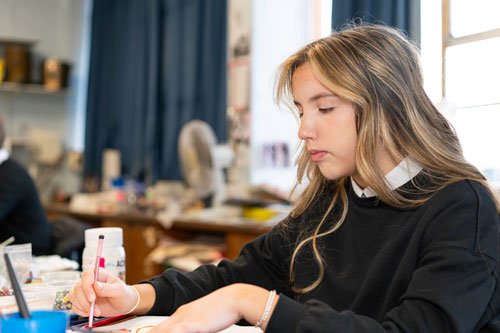Home economics provides an ideal context for personal and social development. Through practical activity, young people are involved in task management and teamwork. They are encouraged to reflect on their own work and to offer constructive comment on the work of others.
Young people often gain a great deal of satisfaction from the outcome of practical activity, whether that outcome is, for example, an artefact, a successful event or the solution to a problem. That feeling of satisfaction helps to increase their confidence and self-esteem.
Home economics can also help to develop a sense of mental wellbeing by encouraging young people to pursue activities and learn skills which they may then continue in leisure pursuits.
What skills can be developed?
Dexterity, communication, team work, time management and organisation, problem solving.
Broad General Educatiion (BGE) Curriculum
Textile
S3 Practical Cookery
S3 N1/2 Food Health and Wellbeing
Assessment information
To achieve the National 2 Food, Health and Wellbeing Course, learners must pass all of the required Units. The required Units are shown in the Course outline section.
National 2 Courses are not graded.
Senior Phase
S4 N3/4/5 Health and Food Technology
Units covered:
S4 N3/4/5 Practical Cookery
Units covered:
S5/6 N3/4/5 Practical Cookery
Units covered:
S5/6 N5 SfW Early Learning Childcare
Units covered:
National 5 Skills for Work: Early Learning and Childcare (previously Early Education and Childcare) is an introductory qualification that develops the skills, knowledge, and attitudes needed for work in the early learning and childcare sector.
At National 5, learners begin to prepare for working in the sector. They also develop transferable employability skills, including:
At SCQF level 5, learners work alone or with others on straightforward tasks with support.
This qualification covers areas such as the Development and Wellbeing of Children and Young People, Play in Early Learning and Childcare, and Working in Early Learning and Childcare.
Exam information
Practical Cookery
The course consists of 24 SCQF credit points which includes time for preparation for course assessment. The notional length of time for a candidate to complete the course is 160 hours.
The course assessment has three components.
Component Marks Scaled mark Duration
Component 2 and component 3 are inter-related and will be assessed using one activity. Candidates will carry out one task — planning and producing a meal — which will provide evidence for both components.
Certificate course requirements
Recommended entry Progression Entry to this course is at the discretion of the centre. Candidates should have achieved the fourth curriculum level or the National 4 Practical Cookery course or equivalent qualifications and/or experience prior to starting this course.
Health and Food Technology (HFT)
The course consists of 24 SCQF credit points which includes time for preparation for course assessment. The notional length of time for a candidate to complete the course is 160 hours.
The course assessment has two components.
Component Marks Duration
Certificate course requirements
Recommended entry Progression
Entry to this course is at the discretion of the centre.
Candidates should have achieved the fourth curriculum level or the National 4 Health and Food Technology course or equivalent qualifications and/or experience prior to starting this course.
Progression – Higher Health and Food Technology course or relevant component Units SQA qualifications in health and food technology or related areas further study, employment or training.
Skills for Work Early Learning and Childcare
There is no external assessment for this Course. Learners must successfully complete each Unit to achieve the Course.
Unit specifications provide detailed information on the Evidence Requirements for each Unit. The Unit Support Notes provide information on approaches to assessment for each Unit.
The Units are internally assessed by centres and externally verified by SQA.
Extracurricular opportunities
Seasonal after school clubs.
Staff and students Christmas Cake Making Club (November to December).
Trips
Royal Highland Show (June)
Members of the Home Economics Department
Graziella Gungui Head of Department
Morag Kinloch (P/T teacher)
Sandra Van Aswegen (P/T teacher)
Leigh Wood (P/T teacher)
